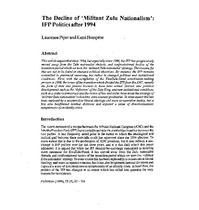| dc.contributor.author | Piper, Laurence | |
| dc.contributor.author | Hampton, Kerri | |
| dc.date.accessioned | 2021-01-28T12:49:08Z | |
| dc.date.available | 2021-01-28T12:49:08Z | |
| dc.date.issued | 1998 | |
| dc.identifier.citation | Piper, L., & Hampton, K. (1998). The decline of ‘militant Zulu nationalism’: IFP politics after 1994 .South African Journal of Political Studies, 25(1), 81-101, | en_US |
| dc.identifier.issn | 1470-1014 | |
| dc.identifier.uri | https://doi.org/10.1080/02589349808705054 | |
| dc.identifier.uri | http://hdl.handle.net/10566/5793 | |
| dc.description.abstract | Abstract
This article argues that since 1994, but especially since 1996, the IFP has progressively moved away from the Zulu nationalist rhetoric and confrontational tactics of the transition period which we term the ‘militant Zulu nationalist’ strategy. The reasons for this are not to be found in changed political objectives, for instance the IFP remains committed to provincial autonomy, but rather in changed political and institutional conditions. First, with the completion of the KwaZulu‐Natal constitution‐making processin 1996, the issues of the transition which divided the IFP from the ANC, namely the form of state and process towards it, have been settled. Second, new political developments such as the ‘defection’ of the Zulu King, and new institutional conditions such as a stake in democracy and the return of law and order, have made the strategy of ‘militant Zulu nationalism’ redundant, even counter‐productive. | en_US |
| dc.language.iso | en | en_US |
| dc.publisher | Taylor & Francis | en_US |
| dc.subject | Militant Zulu nationalism | en_US |
| dc.subject | IFP politics | en_US |
| dc.subject | African National Congress(ANC) | en_US |
| dc.subject | Law and order | en_US |
| dc.subject | Sea-change | en_US |
| dc.title | The decline of ‘militant Zulu nationalism’: IFP politics after 1994 | en_US |
| dc.type | Article | en_US |

